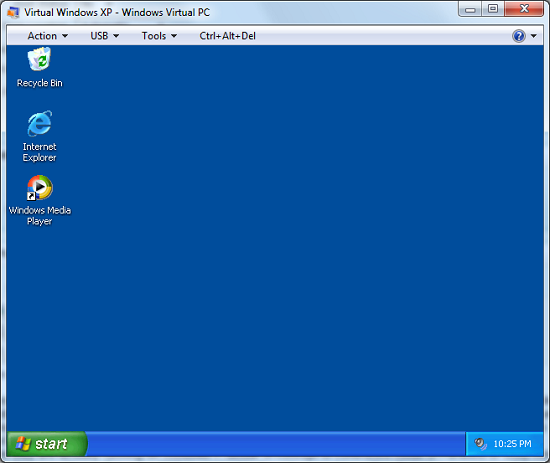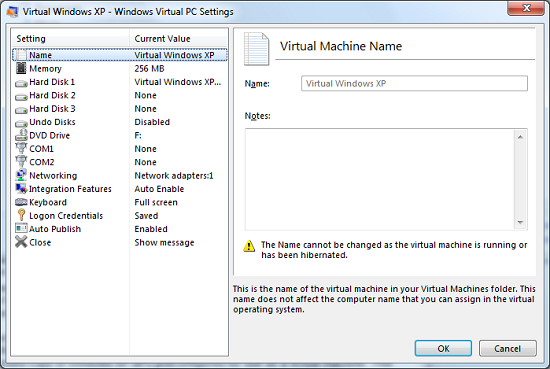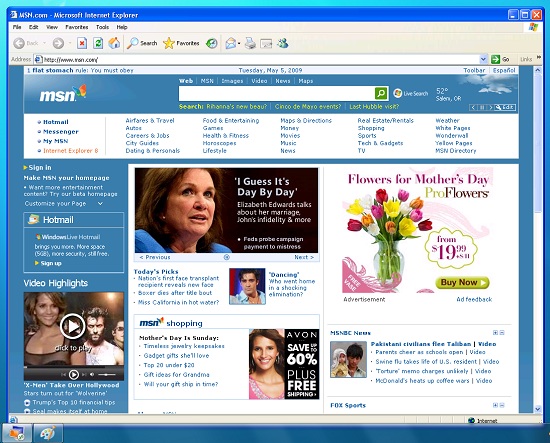Windows 7: Release Candidate 1 Preview
by Ryan Smith and Gary Key on May 5, 2009 11:00 PM EST- Posted in
- Systems
Virtual Windows XP
As we mentioned previously, Microsoft’s big secret unveiled with Windows 7 RC1 is Virtual Windows XP (VXP for short). One of the issues Microsoft has been having in bringing business users over from Win2K and XP to Vista and beyond has been that Windows does not have perfect backwards compatibility. With consumer applications this is not such a big deal since most of those are wide-audience products that get updated regularly, but this is not always the case for business software. Whether it’s some custom in-house application that no one can fix, or a 3rd party application that just works and can’t be updated, business users sometimes can’t escape the fact that they need to be able to run old applications that don’t work in newer operating systems.
VXP is in essence the bone Microsoft is throwing to business users to allow them to run those old applications while using Windows 7. VXP leverages Microsoft’s existing Virtual PC virtualization software that they acquired several years back, by bundling it with a fully licensed copy of Windows XP SP3 preconfigured for use as a virtual machine. This virtual machine can then be partially integrated in Windows 7 so that applications operating inside of it look and behave like they are actually running on Windows XP, similar in concept to the coherence mode of Parallels or Unity mode of VMware. In this case Microsoft is using RDP to connect to the virtual machine rather than screen scraping the entire desktop like Parallels and VMware do. Microsoft does the same thing for the Windows Home Server Console.

VXP Desktop View
As Virtual PC was already free, the significance of this announcement is not the technical details, but rather that Microsoft is endorsing it as an official solution to backwards compatibility problems. It’s long been expected that Microsoft would do something with Virtual PC as a backwards compatibility solution and this is finally it, albeit in a limited role.
Because of the system requirements and issues raised by relying on a virtual machine of XP, VXP is a last-ditch compatibility solution rather than any kind of primary solution. On the system requirement side, VXP requires a processor with hardware virtualization features, along with at least 256MB of RAM and the disk space needed to run the virtual machine. It’s not too bad for a modern system, but it does rule out an older system that may be suitable for upgrading to Windows 7, but not running VXP on top of that.

VXP Configuration
As for the issues raised by using VXP, first and foremost it’s a complete copy of WinXP, with all of its security deficiencies and bugs. It needs security software, it needs administration, and it needs security updates. This also brings up a matter that Microsoft hasn’t answered yet: what happens when WinXP support ends in 2014? Windows 7 will have support until at least 2020, which means either Microsoft is going to drop support for this component of Windows 7 early (an unprecedented move) or they have to extend XP support to match Windows 7’s support cycle. We’re still trying to get a final answer on this.
It should also be noted that VXP only comes with Professional edition and higher, as it’s not intended to be a consumer compatibility solution. And before anyone gets any ideas, it’s not suitable for playing games – the graphics hardware is the usual emulated S3 Trio 64, and the screen does not refresh nearly fast enough to keep up with any kind of action game. Solitaire may be playable, however.

VXP in integrated mode running IE6
At any rate, Virtual Windows XP is a good solution to some compatibility needs, so long as it’s recognized that it’s not the solution to all compatibility needs. For the handful of business users it’s designed for, we would expect that it does its intended job well. However for non-business users that absolutely must have a virtual machine (and won’t need support from Microsoft), it may be worthwhile to look into a free solution like VirtualBox.
Looking towards the future, there has been a lot of speculation that Microsoft may try to make a big break from the Windows APIs in order to clear out all the cruft and deprecated functions that litter their APIs. This isn’t happening today with Windows 7 and VXP, but integrating a virtual machine is the first stepping stone in making it happen. What Microsoft does after VXP is undoubtedly going to be a matter of great interest.










121 Comments
View All Comments
Adul - Wednesday, May 6, 2009 - link
MS cash reserves are actually around $26.3 billionsnookie - Wednesday, May 6, 2009 - link
Apple's stock is dramatically higher and they have much more cash in reserve. Xbox sure in hell was designed to be profitable on both hardware and games and neither is. Microsoft knew they would lose money the 1st few years but nothing like this. It's been a total disaster for them financially.Investors are bullish on Microsoft? Well a lot of them aren't. Microsoft lost half its value in 2008. Half.
Q9 has not been dismal for Apple. Biggest 2nd quarter ever in the middle of a recession. i guess that must be because of their commercials though....new iPhone coming up in June which will sell as fast as they can make them and Microsoft can't even get that blind, crippled, and dumb Windows Mobile out the door. This is a company in dire need of new leadership and middle management. Instead their answer is to rant and rave and piecemeal out development to whichever country is cheaper this week? Sound like a long term formula to success to you?
chewietobbacca - Thursday, May 7, 2009 - link
You're kidding right? Apple's stock is higher but their market cap is worth $60 billion less because share prices don't mean sh!t. Apple has fewer shares out there hence each one is worth more, but MSFT is still worth 60billion more than AAPL, and if MSFT goes up to $24 a share again, it'll be worth even more.Patrick Wolf - Wednesday, May 6, 2009 - link
Psycho...Jjoshua2 - Wednesday, May 6, 2009 - link
That's good to see its performance is good in general, and its gaming is consistently higher as well. Posting from Windows 7 on my Wind Netbook FTW :)Any pricing news? I hope there's a great student rate.
griffhamlin - Wednesday, July 15, 2009 - link
"gaming perfs constistently higher" ???are you kidding ? the song remain the same ...
samspqr - Wednesday, May 6, 2009 - link
the main reason I hate vista is because it's not XP: everything looks different, I can never find what I'm looking for, so getting used to it would require an effort that doesn't seem to have any compensating advantages (I don't like fancy UIs -I still use the W2K look- and I don't really play games anymore)then, about windows7, I still feel it's just a re-spun new SP for vista, with a UI revision, and the only reason it's getting better reviews than the original vista is that some time has passed, so there are better drivers, and you're testing it on much more powerful hardware
now, that Wind comment makes me wonder...
may even I fall on this one?
we'll see
cyriene - Wednesday, May 6, 2009 - link
I never understood how XP users say they "can never find anything in Vista."I'm not Windows expert, but after using my new laptop with Vista for 3 hours I knew where over 95% of the things and setting are located. And mos tof them are in the same place as XP for that matter. Control panel is the same... Start menu slightly different, but similar enough to figure out in 5 seconds. Plus if there is something you're looking for, the Vista help search actually ...HELPED me find it! I was actually suprised how well the help works. Also, if that failed a quick Google search is all it takes.
I don't feel MS should make ever OS exactly the same with everything in the same place. It makes sense for some things to move, and it isn't hard to find them if you take 5 seconds to do that.
dmpk - Saturday, May 30, 2009 - link
I agree. I think it is easy to find stuff on Vista with a little bit of playing. The transition is same as that from Windows 98 to Windows XP...piroroadkill - Thursday, May 7, 2009 - link
I completely agree. If you can't find something in Vista and you're used to XP, it's either so unused that it was removed, or you're just not trying, at all.